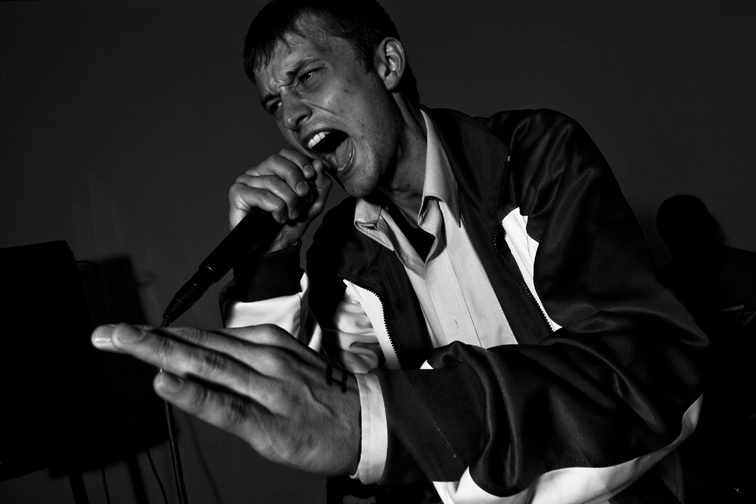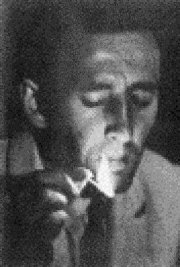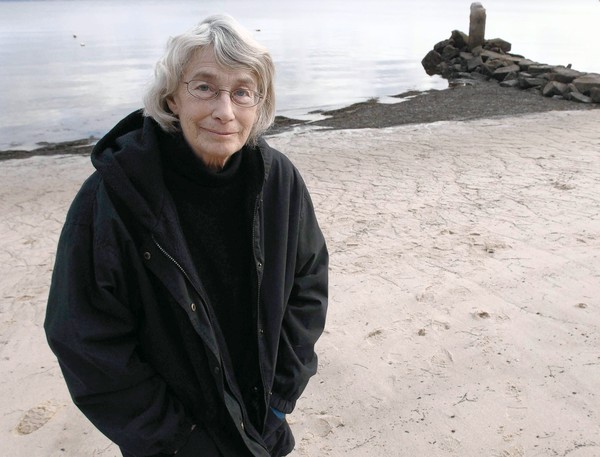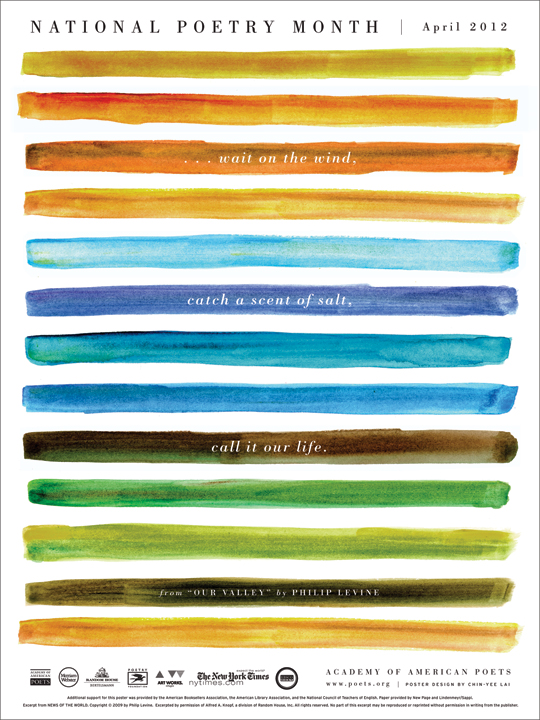POETRY MONTH 30/30/30: Inspiration, Community, Tradition :: DAY 7: Gregory Crosby on Kenneth Fearing
 When I moved to New York nearly eight years ago, I became a determined flâneur—in Baudelaire’s formulation, one who walks the city in order to experience it—and although the New York I walked was not 1929 or 1938 or 1943, I heard everywhere, persistent, sardonic, and expansive, the voice of Kenneth Fearing (1902-1961) in the back of my mind. To read Fearing is to suddenly meet Walt Whitman not in a supermarket but in the neon shadows of a film noir. I can think of few other poets who capture the alienation and exultation of urban existence, at once cosmopolitan and proletariat, sophisticated and vulgar. To live in a city is to live at all times inside the human mind: Fearing’s best poems buzz in that hive of loneliness and longing:
X Minus X
Even when your friend, the radio, is still; even when her dream, the magazine, is finished; even when his life, the ticker, is silent; even when their destiny, the boulevard, is bare;
And after that paradise, the dance-hall, is closed; after that theater, the clinic, is dark,
Still there will be your desire, and hers, and his hopes and theirs,
Your laughter, their laughter,
Your curse and his curse, her reward and their reward, their dismay and his dismay and her dismay and yours—
Even when your enemy, the collector, is dead; even when your counselor, the salesman, is sleeping; even when your sweetheart, the movie queen, has spoken; even when your friend, the magnate, is gone.
When I moved to New York nearly eight years ago, I became a determined flâneur—in Baudelaire’s formulation, one who walks the city in order to experience it—and although the New York I walked was not 1929 or 1938 or 1943, I heard everywhere, persistent, sardonic, and expansive, the voice of Kenneth Fearing (1902-1961) in the back of my mind. To read Fearing is to suddenly meet Walt Whitman not in a supermarket but in the neon shadows of a film noir. I can think of few other poets who capture the alienation and exultation of urban existence, at once cosmopolitan and proletariat, sophisticated and vulgar. To live in a city is to live at all times inside the human mind: Fearing’s best poems buzz in that hive of loneliness and longing:
X Minus X
Even when your friend, the radio, is still; even when her dream, the magazine, is finished; even when his life, the ticker, is silent; even when their destiny, the boulevard, is bare;
And after that paradise, the dance-hall, is closed; after that theater, the clinic, is dark,
Still there will be your desire, and hers, and his hopes and theirs,
Your laughter, their laughter,
Your curse and his curse, her reward and their reward, their dismay and his dismay and her dismay and yours—
Even when your enemy, the collector, is dead; even when your counselor, the salesman, is sleeping; even when your sweetheart, the movie queen, has spoken; even when your friend, the magnate, is gone.
POETRY MONTH 30/30/30 : Inspiration, Community, Tradition : DAY 5 :: Caits Meissner on Adam Falkner
 photo: jonathan weiskopf[/caption]
Adam Falkner is a poet, musician, high school English/Creative Writing teacher and former Michael Jackson dance-off champion – although he will probably deny the latter of those if asked. In addition to being published in anthologies and journals including decomP Magazine, The Esu Review, and The Other Journal, Adam’s poems have also been featured on HBO, BET, Michigan and New York Public Radio and in Time Out New York. He lives and works in Brooklyn.
Succinct Musing from Caits Who is Secretly in Love with Adam, but Only His Brain Because She is Married to Someone Else:
A few short months ago over dinner, I looked at Adam with a suspicious side eye. He appeared a blurry apparition through the candle light, or maybe from the second glass of wine I'd just finished. He was smiling a very nice smile because he is a very nice guy. I was giving him this unusual look because everything he said was eerily familiar. The voice in my head said, Are you me?
photo: jonathan weiskopf[/caption]
Adam Falkner is a poet, musician, high school English/Creative Writing teacher and former Michael Jackson dance-off champion – although he will probably deny the latter of those if asked. In addition to being published in anthologies and journals including decomP Magazine, The Esu Review, and The Other Journal, Adam’s poems have also been featured on HBO, BET, Michigan and New York Public Radio and in Time Out New York. He lives and works in Brooklyn.
Succinct Musing from Caits Who is Secretly in Love with Adam, but Only His Brain Because She is Married to Someone Else:
A few short months ago over dinner, I looked at Adam with a suspicious side eye. He appeared a blurry apparition through the candle light, or maybe from the second glass of wine I'd just finished. He was smiling a very nice smile because he is a very nice guy. I was giving him this unusual look because everything he said was eerily familiar. The voice in my head said, Are you me?POETRY MONTH 30/30/30: Inspiration, Community, Tradition: Day 4 :: Tishon Woolcock on Orhan Veli Kanik
 I’m going to level with you; I know nothing about Turkey and I know even less about Turkish Poetry. Luckily, I have Buké, my sole Turkish friend. Buké is tiny, smokes cigarettes, and speaks with a directness that can sometimes be mistaken for rudeness. It is she who introduced me to the Turkish poet Orhan Veli Kanik (1914-1950). I can’t speak to Kanik’s stature but, like Buké, his poetry is about as direct as a poet can get. Like the work of William Carlos Williams or, more contemporarily, Billy Collins, Kanik’s poems have been described as the kind of poetry that convinces readers they, too, can write a poem. Take, for example, “The Hill”.
I’m going to level with you; I know nothing about Turkey and I know even less about Turkish Poetry. Luckily, I have Buké, my sole Turkish friend. Buké is tiny, smokes cigarettes, and speaks with a directness that can sometimes be mistaken for rudeness. It is she who introduced me to the Turkish poet Orhan Veli Kanik (1914-1950). I can’t speak to Kanik’s stature but, like Buké, his poetry is about as direct as a poet can get. Like the work of William Carlos Williams or, more contemporarily, Billy Collins, Kanik’s poems have been described as the kind of poetry that convinces readers they, too, can write a poem. Take, for example, “The Hill”.THE HILL
Poetry Month 30/30/30: Inspiration, Community, Tradition: DAY 3 :: Bill Considine on Elinor Nauen
POETRY MONTH 30/30/30: Inspiration, Community, Tradition :: DAY 2: Pete Reilly on Mary Oliver
 Today we begin the community portion of our Poetry Month: Inspiration, Community, Tradition series with Peter Reilly writing on Mary Oliver's poetry and its influence on his work.
PR: Mary Oliver's gift is to describe the natural world simply, in a way that reveals the deepest secrets of our human heart. She is grounded in the reality of survival - life and death - predator and prey; yet never loses her eye for the eternal, for amazement, and for the magic of transformation.
From "Wild Geese"
You do not have to be good.
You do not have to walk on your knees
for a hundred miles through the desert repenting.
You only have to let the soft animal of your body
love what it loves.
[caption id="attachment_434" align="alignright" width="300" caption="photo: Brian Reilly"]
Today we begin the community portion of our Poetry Month: Inspiration, Community, Tradition series with Peter Reilly writing on Mary Oliver's poetry and its influence on his work.
PR: Mary Oliver's gift is to describe the natural world simply, in a way that reveals the deepest secrets of our human heart. She is grounded in the reality of survival - life and death - predator and prey; yet never loses her eye for the eternal, for amazement, and for the magic of transformation.
From "Wild Geese"
You do not have to be good.
You do not have to walk on your knees
for a hundred miles through the desert repenting.
You only have to let the soft animal of your body
love what it loves.
[caption id="attachment_434" align="alignright" width="300" caption="photo: Brian Reilly"] [/caption]
But little by little
as you left their voices behind,
the stars began to burn
through the sheets of clouds
and there was a new voice
which you slowly
recognized as your own
that kept you company
as you strode deeper and deeper
into the world,
determined to do
the only thing you could do -
determined to save
the only life you could save.
[/caption]
But little by little
as you left their voices behind,
the stars began to burn
through the sheets of clouds
and there was a new voice
which you slowly
recognized as your own
that kept you company
as you strode deeper and deeper
into the world,
determined to do
the only thing you could do -
determined to save
the only life you could save.
CoCo Online POETRY MONTH PROJECT: 30 posts, 30 poets, 30 days: call for participants!









